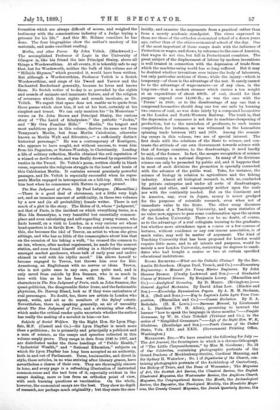Subjects of Social Welfare. By the Right Hon. Sir Lyon
Play- fair, M.P. (Cassell and Co.)—Sir Lyon Playfair is much more than a politician ; he is primarily and principally a publicist and a man of science, as the essays and speeches coollected in this volume amply prove. They range in date from 1846 to 1887, and are distributed under the three headings of "Public Health,"
"Industrial Wealth," and "National Education," subjects on which Sir Lyon Playfair has long been accepted as an authority, both in and out of Parliament. Terse, businesslike, and direct in
style, these articles, in no wise striving after literary graces, have nevertheless a charm of their own. They are thoroughly sincere in tone, and every page is a refreshing illustration of instructed
common-sense and the tact born of it, especially evident in the essays dealing, more or less from an orthodox point of view, with such burning questions as vaccination. On the whole, however, the economical essays are the beet. They show no depth of research, nor perhaps much originality ; but they state the case
lucidly, and examine the arguments from a practical rather than from a merely academic standpoint. The views expressed in
them are those of the orthodox economical school of a dozen years ago, rather than of the ethico-economical school of the day. One of the most important of these essays deals with the influence of
Protection on wages, and shows, by reference to the ease of America, that wages do not rise, but fall in Protectionist countries. The great subject of the displacement of labour by modern inventions is well treated in connection with the depression of trade from which the machine-using world has so long suffered. But it may be doubted whether inventions ever injure the body of labourers, but only particular sections of them ; while the injury—which is temporary—of these is the advantage of the rest. It surely cannot be to the advantage of wage-earners--or of any class, in the long-run—that a modern steamer which carries a ton weight at an expenditure of about 400 lb. of coal, should for that purpose expend over 14,000 lb., as was the case with the Persia' in 1850; or to the disadvantage of any one that a compound locomotive should drag one ton one mile by burning two ounces of coal, as was done lately by a compound locomotive on the London and North-Western Railway. The truth is, that the depression of commerce is not due to machine-cheapening of production, but to the unwisdom of producers, to such insane competition, for instance, as was witnessed in the Lancashire spinning trade between 1871 and 1878. Among the remain- ing essays in this volume, two are of special interest. The first deals with the relations of the State to science, and con- trasts the attitude of our own Government towards science with that of foreign countries, to the disadvantage, it need hardly be said, of the former. In fact, the meagre recognition of science in this country is a national disgrace. In many of its divisions science can only be promoted by public aid, and it happens that in most of such divisions the promotion is specially connected with the advance of the public weal. Take, for instance, the science of biology in relation to agriculture and the fishing industry. Almost all biological research is, with us, conducted by private enterprise and under all sorts of disadvantages, financial and other, and consequently neither upon the scale nor with the continuity needed. But on the Continent and in America, nay, even in Japan, money is never grudged for the purposes of scientific research, even when not of immediate value to the State. The other essay discusses the question of a Teaching University, and upon statistics of no value now, appears to pass some condemnation upon the system of the London University. There c In be no doubt, of course, as to the advantage of a real collegiate training to the graduate; but whether mere attendance upon a curse or a few courses of lectures, without residence or any con inuons association, is of much value, may well be matter of argument. The kind of Teaching University that has been proposed for London would require little more, and to all intents and purposes, would be merely a new London University, restricting its degrees to candi- dates who had bought a course or two at certain specified educational institutions.


































 Previous page
Previous page